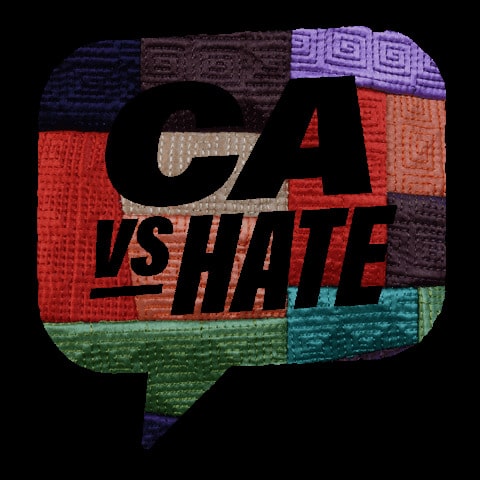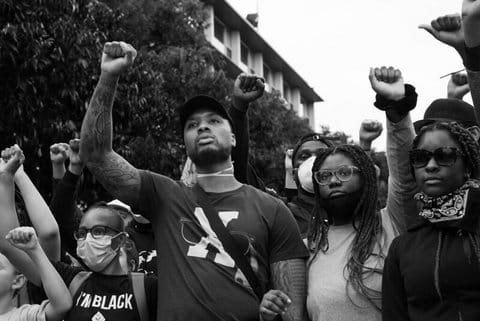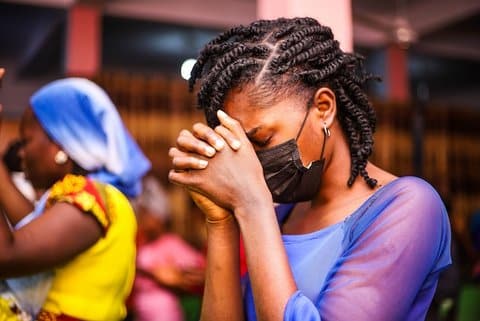
26 Apr Q&A: Oakland’s CURYJ Combats Hate Through Community Building and Cultural Unity

Interview, Malcolm Marshall
Editor’s Note: The Oakland nonprofit Communities United for Restorative Youth Justice, or CURYJ —pronounced “courage” — mobilizes young leaders to end youth criminalization and mass incarceration. Its work includes teaching ethnic studies, life coaching, professional development, political education, facilitating restorative justice, and sharing culturally rooted healing practices.
The Pulse sat down with Ricardo Garcia-Acosta, CURYJ’s director of community peace, to discuss the group’s work with California’s Stop the Hate initiative. This conversation has been edited.
CC Pulse: What kind of services do you offer for victims of hate crimes and incidents?
Ricardo Garcia-Acosta: Because of the work we do, we are in a unique position to be a strong partner within the Stop the Hate cohort to work with young people that are at the center of violence.
There’s a spectrum of how marginalized communities experience victimization, everywhere from the bigoted, racist, pure hate crimes to people victimized because they’re easy targets in a marginalized population: our AAPI community and the immigrant newcomer Latino community and Indigenous community — Central American Mam that don’t speak English or Spanish, they often get victimized, robbed and taken advantage of on the streets of Oakland. Not necessarily because people hate them for being Indigenous or hate them because they’re Latin-speaking or resemble that culture but more so because they’re easy targets. They’re easily marginalized. They don’t report crimes, and because they’re undocumented most of the time, it’s well-known they carry a lot of cash.
>>>Commentary: Why I Am Letting Go of ‘Latino’ as Part of My Self-Identification
Oftentimes, the perpetrators are young people committing survival crimes because they don’t have resources. They have preexisting trauma. It goes back to the old adage of hurt people hurt people and healed people heal people.
Specific to Stop the Hate, we’re funded for three strategies. One is to provide curriculum that addresses the victimization of marginalized populations and hate crimes as those populations experienced them so that young people can see the impacts and appreciate and understand the plight of those communities and what it takes for them to survive.
The second is to provide violence interruption and have an in-house violence interrupter work with families directly when they are victimized. They help them navigate victim resources, any safety net services they might need. There are times when people get robbed, and that was rent. So how do we help them with housing or grocery support if folks find themselves victimized?
Third is to put on eight community, peace-building and cultural unity events. These are at the heart of everything we do, because all of our strategies culminate into these events. We do an annual turkey giveaway during the Thanksgiving season, and we do a toy giveaway during the winter. We employ, on average, 30 young people at these block parties. We bring together African American, Latino, Indigenous and AAPI communities, and we have cultural unity representation. We create safe spaces, so these marginalized communities can come out with their families and not feel like they’re going to be victimized.
The young people are serving food; they’re making sure the elders are safe, that they have water. The young people see these older immigrant families, these older Asian American families standing in line for hours just to get food. That builds empathy so that when they look at this population, there’s no way — when they see them on the streets, no matter how hungry they are, no matter how much they feel like they need money, they’ll never again want to victimize them and look at them as the target or an easy victim. They now look at them as an elder in our community. And they appreciate their culture and all of our common struggles. That’s the unique way we’ve been implementing the Stop the Hate grant: direct service community building, working with direct victims of violence, and working with young people so that they don’t further the cycles of violence and victimizing these marginalized populations.
CC Pulse: In terms of hate, what kinds of issues are people coming to you with?
RGA: We’re partnering with Trybe, also in Oakland. They provide services in Little Saigon, the Vietnamese corridor in Oakland. A lot of business owners and elders have been victims of violence and gun-related robberies. Similarly, we’ve been working with a small merchants group in the Fruitvale district that are all Latino immigrants, and they have had a similar experience of their businesses being broken into and their (customers) being robbed. They have been robbed when they’re closing the shops and don’t feel safe to the point where their businesses are struggling and they’re closing down.
>>>Read: Oakland Police To Step Up Surveillance In Little Saigon After Killing Of Beloved Dentist
Within schools, there’s a lot of cultural violence. The African American population will get into it with the immigrant Latino population or victimize the Asian population or the Asian population having distrust of the Latino population. We’ve been doing workshops and assemblies in the high schools, and through our violence intervention work, we’ve been able to address and mediate conflicts that are race- and culture-related, to bring folks together, have a common understanding, and work together. That has been a very powerful strategy.
>>>Commentary: RHS Student Wants to Take the N-Word ‘Out of People’s Vocabulary’
CC Pulse: Are you doing outreach to encourage people to report and if so, how’s that going?
RGA: We’ve partnered in Oakland with the Department of Violence Prevention to open a satellite office at the Fruitvale Transit Village, which provides community resources. We’re having drop-in days where merchants, family members, anybody that’s victimized — from a hate crime, robbery, things of that nature — could fill out confidential reports and then our system navigators and violence interrupters can help them get resources and explain their rights as a victim. We’re in the process of working with Victim Services D.A. to establish that DVP office as an outpost so at least once a week, victim advocates can work out of there, making access to information easy because there’s a lot of misinformation about victim services and resources, especially with undocumented folks or recent immigrants because of the fear of being reported to ICE or federal authorities. So a lot of work is being done to make sure folks know their rights and that there’s easy access points for them to be able to file claims and get resources.
CC Pulse: Are people feeling safer in the community as opposed to a year ago?
RGA: Oakland is one of the rare cities where levels of violence have not come back down to pre-pandemic levels. Prior to the pandemic, Oakland, I want to say in 2019, we had about 79 homicides. For the last three years, we’ve been pushing 120 homicides, and those levels have not shown any decrease.
The general sense in Oakland is that many people still feel unsafe, many businesses still feel unsafe. But there’s a movement that we’ve been building in the Fruitvale district where we primarily operate. Over the last six months, we’ve seen a tangible paradigm shift where they’re like, hey, we don’t need more police. We just need the police that we do have to do their job and not be corrupt and to give us as much attention as they do other business corridors. One of the issues is whenever OPD responds to Fruitvale-related issues within the Latino immigrant community, they never have Spanish (speakers), and language capacity is a huge issue.
The other part of that paradigm shift is saying, we know there are community resources that are going to keep us safe. The strategies are based on relationship building, identifying people at the center of violence, and being able to support them and run interventions in a way that locking people up doesn’t have. They’re starting to understand that locking people up and cycling them through the criminal justice system only creates better criminals, and then they come back on the streets with the same thing.
So although folks still feel really uneasy, they feel like they have some answers. They began to organize themselves and have merchant walks in partnership with our outreach teams. They started to have phone trees where they are all communicating. We’ve hosted in partnership with them community cleanup days and encouraged people to patronize the business corridors and rebrand the Fruitvale as safe and vibrant and try to get rid of the stigma. There’s been a huge shift in the community to self-determination, to be solution-oriented, and to know where to go to when they have challenges.
CC Pulse: What other strategies are you using to promote understanding between different racial groups?
RGA: We have been doing work around dismantling anti-Blackness. That was huge in our community. Our young Black brothers and sisters were very quick to get fingers pointed at them like they’re the ones causing all the problems. We had to work with our own community — similar to some folks in the Asian community having to work with their own community — we had to work with our own Latino immigrant community and be able to say, hey, it’s not the Black people that’s the problem. We had to build empathy and understanding within their perspective, to understand the struggle that young people are going through, the lack of guidance, the cycles of violence, and how the war on drugs has perpetuated all this stuff.
>>>Commentary: Black Liberation Is Latinx Liberation Too
We did a study about five years ago. There was a bunch of paleteros and day laborers getting robbed, and they were blaming Black people. It turned out it was American-born Latinos victimizing immigrant-born Latinos. We use that as an example when we’re talking to business owners; every time we hear the slightest bit of anti-Black rhetoric come out, we stop it right there. We’re very clear this is not a race issue. This is not because they’re Black and you’re Latino or they’re Black and you’re Asian. That is not why this is happening. Just like not all Latinos are narco-traffickers, not all Black people are here to rob you. And that’s a stern message we’ve been delivering. You’re going to understand the dynamics of why these things are happening in our community.
Any victim of or witness to a hate incident or crime in California can report it and receive support any time at CAvsHate.org. You can also call 833-8-NO-HATE; (833) 866-4283 Monday – Friday from 9:00 am – 6:00 pm. If outside of those hours, you can leave a voicemail, or you can call 211 to report hate and seek support. You can currently submit reports online in 15 languages and, when calling the hotline, you can get access to support in over 200 languages. If you want to report a hate crime to law enforcement immediately or you are in present danger, please call 911.
This resource is supported in whole or in part by funding provided by the State of California, administered by the California State Library in partnership with the California Department of Social Services and the California Commission on Asian and Pacific Islander American Affairs as part of the Stop the Hate program. To report a hate incident or hate crime and get support, go to CA vs Hate.






No Comments